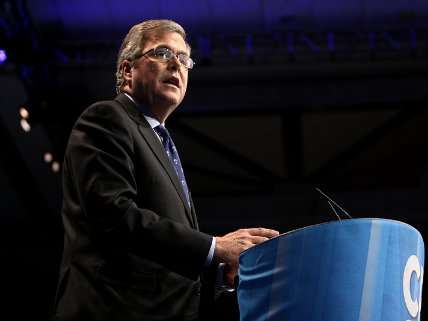Jeb Bush: "I don't understand the debate" Over the NSA's Bulk Phone Records Collection Program
It doesn't work. It's unconstitutional. And it intrudes deeply into the privacy of millions.

Just in case there was any doubt, Jeb Bush decided to clear up any lingering questions about where he stood on one of his brother's more controversial programs: the National Security Agency's bulk collection of telephone metadata under Section 215 of the Patriot Act.
In a speech in Florida, Bush, the former Florida governor who recently announced his intention to "actively explore the possibility" of a 2016 presidential run, said that "For the life of me, I don't understand the debate" over the program, according to The Wall Street Journal. The program, instituted in the wake of the September 11th terror attacks under the administration of Jeb's brother, President George W. Bush, allows the NSA to collect, store, and analyze masses of data on phone call patterns.
It's a short remark, but it says a lot—both about Bush and the current way that the program is defended.
What Bush offered is a classic non-defense defense. Not only does it signal support for the program, a favorite of Bush administration hawks, it suggests surprise at the idea that anyone would find the program controversial or worthy of discussion. It's not so much an attempt to defend the program as it is an attempt to minimize, and arguably to entirely dismiss, debate about the program.
How could anyone be bothered by the program? After all, it doesn't collect call content, and, as the Journal notes, "supporters say it helps the U.S. government prevent terrorist attacks."
For one thing, there is, at minimum, disagreement over whether it actually prevents attacks. As a task force created by the Obama administration to review the program found in 2013, "the information contributed to terrorist investigations by the use of section 215 telephony meta-data was not essential to preventing attacks and could readily have been obtained in a timely manner using conventional section 215 orders."
As Cato Institute scholar Julian Sanchez noted in The Atlantic, the report's authors concluded that, contrary to assertions by defenders that the program was vital in dozens of cases, the metadata program "generated relevant information in only a small number of cases, and there has been no instance in which NSA could say with confidence that the outcome would have been different without the section 215 telephony meta-data program."
And then there are the significant constitutional concerns. The indiscriminate program affects millions, most of whom have no connection to terror, but it was started in secret and operates with little oversight.
A little more than a year ago, U.S. District Judge Richard Leon, a judge appointed by President George W. Bush, wrote in a ruling that he could not "imagine a more 'indiscriminate' and 'arbitrary invasion' than this systematic and high-tech collection and retention of personal data on virtually every citizen for purposes of querying and analyzing it without prior judicial approval. Surely," he said, "such a program infringes on 'that degree of privacy' that the Founders enshrined in the Fourth Amendment."
So it probably doesn't work, and there's a strong argument that it violates the Constitution. Those both sound to me like pretty good reasons for a debate.
But forget all that for a moment. Does Jeb Bush truly not understand that some people—indeed, quite a lot of people—might find a vast, secret, program to spy on millions of citizens to be a little bit creepy? That many in the public might understandably find this to be a potential government overreach, or an abuse of federal power?
Perhaps he really doesn't. If so, that should disqualify him from the GOP's presidential nomination before his run even officially starts. But I doubt that he is truly as flummoxed by concerns about the program as his dismissive remark suggests.
Instead, I suspect he knows all too well what the program entails, what its critics argue, and why it has remained a topic of controversy for so long. But Jeb Bush does not want to defend the particulars of the initiative so much as he wants to publicly stand by his brother's administration and then settle the issue by declaring that it is not one. Despite his declaration yesterday that he is his "own man," and not his brother or father, he would not even broach the possibility that his brother's program might be deserving of any critique.
Put another way: Jeb Bush claims he doesn't understand the debate because he doesn't want there to be a debate. But there is one, and if he is to run for president, he will have to take part in it.
